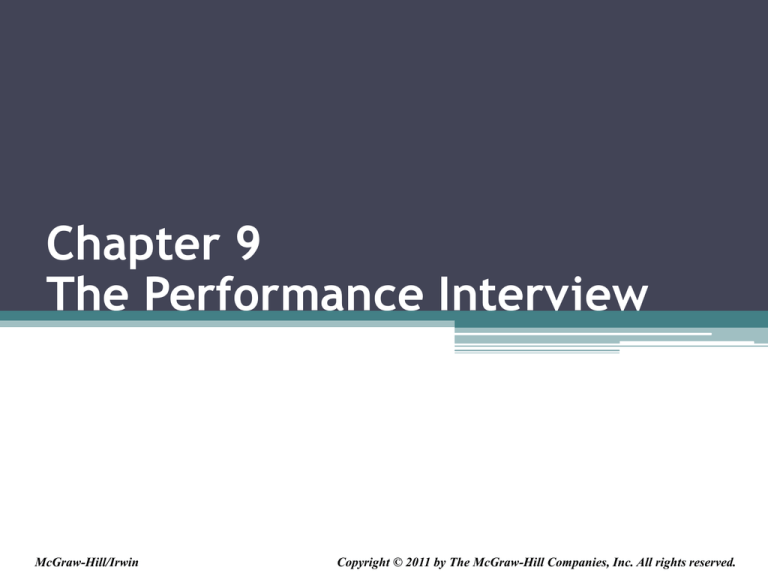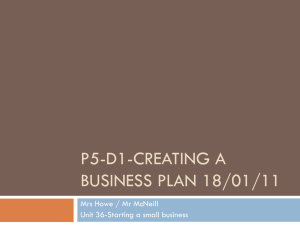
Chapter 9
The Performance Interview
McGraw-Hill/Irwin
Copyright © 2011 by The McGraw-Hill Companies, Inc. All rights reserved.
9-2
Chapter Summary
•
•
•
•
•
•
Preparing for the Performance Interview
Selecting an Appropriate Review Model
Conducting the Performance Interview
The Employee in the Performance Review
The Performance Problem Interview
Summary
9-3
9-4
Preparing for the Performance
Interview
• Preparation Advice
▫ Supportive Climate is Preferred by Interviewees
▫ Regular Feedback Avoids Surprises
▫ Interviewers Must be Trained
9-5
9-6
Preparing for the Performance
Interview
• Reviewing Rules, Laws, and Regulations
▫ Be careful of judging what you cannot measure.
▫ Changing demographics have led to changes in
methods and assumptions.
▫ Age will play an ever-greater role as baby boomers
turn 50 and 60 in ever-greater numbers.
9-7
Selecting an Appropriate Review Model
• Behaviorally Anchored Rating Scales (BARS)
Model
• Management by Objectives (MBO) Model
• Universal Performance Interviewing Model
• The 360-Degree Approach
9-8
Conducting the Performance Review
Interview
• Do your homework.
• Select and understand the perspective of the
interview.
• Relationship influences both parties and the
nature of the interview.
9-9
Conducting the Performance Review
Interview
• Opening the Interview
▫ Climate and atmosphere are critical.
▫ Be prepared but flexible in opening the interview.
9-10
Conducting the Performance Review
Interview
• Discussing Performance
▫
▫
▫
▫
▫
▫
▫
▫
Use all of your listening skills.
Feedback is central in performance interviews.
Develop a true dialogue with the interviewee.
Enhance trust and cooperation to avoid conflict.
Strive for a balance between praise and criticism.
Be aware of potential biases.
Know how to conduct performance interviews.
Use question tools to gain and verify information.
9-11
Conducting the Performance Review
Interview
• Setting New Goals and a Plan of Action
▫ Focus on the future and not the past.
▫ The interviewee must be an active participant.
▫ Review the last period’s goals before going on to
new ones.
▫ Do not make the goals too easy or too difficult.
9-12
Conducting the Performance Review
Interview
• Closing the Interview
▫ Close with the perception that the interview has
been valuable for both parties.
9-13
Conducting the Performance Review
Interview
9-14
The Employee in the Performance
Review
•
•
•
•
•
Do a self-evaluation before the interview.
Approach the interview with a positive attitude.
Avoid unnecessary defensiveness.
A good offense is better than a good defense.
Leave your temper at the door.
9-15
The Performance Problem Interview
• The need for discipline has become a
performance problem.
• Determining Just Cause
▫ Know what constitutes a just cause.
▫ Treat all employees fairly and equally.
▫ The punishment must fit the infraction.
9-16
The Performance Problem Interview
• Preparing for the Interview
▫
▫
▫
▫
▫
▫
Practice before conducting the real thing.
Be prepared for common reactions and responses.
What evidence do you have of the infraction?
Distinguish between the severity of infractions.
Learn why an infraction has occurred.
Relational dimensions are critical in performance
problem interviews.
9-17
The Performance Problem Interview
• Keeping Self and Situation Under Control
▫
▫
▫
▫
Uncontrolled anger can destroy an interaction.
Timing of the interview may be critical.
Hold the interview in a private location.
With severe problems, consider obtaining
assistance.
▫ Consider including a witness or union
representative.
9-18
The Performance Problem Interview
• Focusing on the Problem
▫ Deal with facts rather than impressions and
opinions.
▫ Avoid unsupported accusations.
▫ Ask questions that draw out the interviewee.
9-19
The Performance Problem Interview
• Avoiding Conclusions During the Interview
▫ Be slow to draw conclusions.
▫ Do not verbalize conclusions during the interview.
9-20
The Performance Problem Interview
• Closing the Interview
▫ Conclude the interview in neutral.
▫ If discipline or termination is appropriate, do it.
▫ Delaying action may enable you to think more
clearly about the incident.
▫ Apply all rules and actions equally to all
employees.
9-21
Summary
• Evaluate an employee’s performance on the
basis of standards mutually agreed upon ahead
of time.
• Apply the same standards equally to all
employees performing a specific job.
• Flexibility and open-mindedness are important
keys in successful performance review
interviews.
• The performance process must be ongoing.







